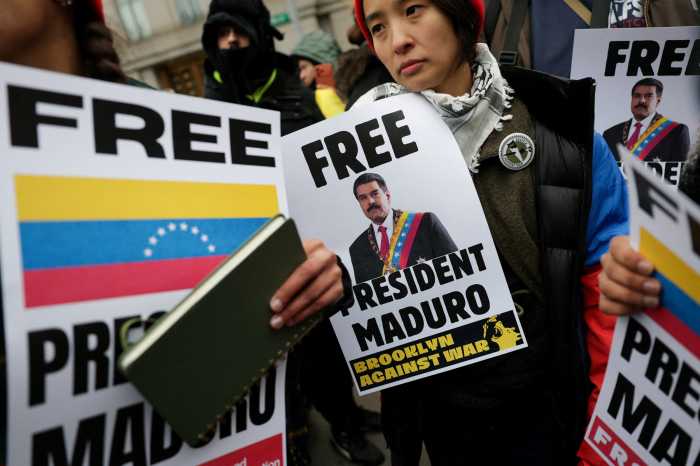Thank the heavens for John Murtha, the Pennsylvania congressman, who has forced the Democrats to speak about the war.
Murtha, an ex-Marine colonel has been a hawk for nearly 30 years but on November 13 announced that it was time for the United States to leave Iraq. He spoke to the Democratic Caucus in the House of Representatives and received a standing ovation.
The U.S. has become the enemy and has united the people of Iraq. The main reason for going to war—weapons of mass destruction has been “discredited.” Budget lines for the actual defense of the nation are being cut while Pentagon personnel costs, especially for health care, are “skyrocketing.” Oil and energy production in Iraq are still below pre-war levels. Unemployment in that country is 60 percent. And clean water is scarce.
But above all else there is this blockbuster fact—insurgent “incidents” have increased from 150 a week to more 700 in the last year. If you look at the timeline of U.S. military deaths, said Murtha at a news conference subsequent to the caucus appearance, “you’ll see one per day average before Abu Ghraib. After Abu Ghraib, you’ll see two a day—two killed per day because of the dramatic impact that Abu Ghraib had on what we were doing.”
Murtha urged a pullout to let the Iraqis confront their own civil war. He would leave troops in Kuwait so they could return within 48 hours if a terrorist training camp was established. He wants it firmly understood that only international terrorism concerns the U.S. The civil war can and should be resolved by the Iraqis without U.S. intervention.
There it is, in roughly 200 words, a crisp rationale for U.S. policy that everyone understands. But Murtha is still the exception.
In the aftermath of the Murtha revolution, Hillary Clinton made a rare statement on the Iraq war. “I do not believe that we should allow this to be an open-ended commitment without limits or end. Nor do I believe that we can or should pull out of Iraq immediately.” A troop pullout can start after the Iraq elections on December 15, while leaving behind a smaller contingent in safer areas, she said.
Clinton defended her statement, in a “Dear Friend” letter to constituents, saying as a senator she has done a good job conducting oversight of the administration fighting efforts and reiterated her position that based on what is known today no war resolution would have made its way through Congress. Her critics gibe that she is betraying her wish that the problem would go away.
Even though she is calling for troop reductions, Clinton aligns herself with the optimists who argue that the major deficiency of the Bush policy is “a public plan for winning and concluding the war.” She nowhere suggests that it is her job as a senator to draft such a plan.
Like Murtha, Clinton acknowledges that Iraq must not become a staging area for international terrorism, but unlike the Pennsylvania congressman she is unwilling to make anti-terrorism the sole justification for U.S. troops remaining in or returning to Iraq.
Clinton’s vagueness on Iraq puts her in good company, a very unfortunate fact. On Monday, December 5, the Washington Post surveyed senior Democratic foreign policy advisers to learn what they “would do if the Iraq problem were handed over to a Democratic administration tomorrow.”
Only one adviser, President Jimmy Carter’s foreign policy maven, Zbigniew Brzezinski, has “an unambiguous alternative.” His plan resembles Murtha’s. U.S. troops should withdraw by the end of 2006. Leaving a small contingent of Americans “would jeopardize” those remaining troops.
“We have to face the fact that the war is not going well and is costing us too much, not only in blood and money but also in the U.S. position in the world, discrediting our legitimacy, credibility and morality even,” Brzezinski told the Post.
Brzezinski, as does Murtha, favors keeping some U.S. forces in Kuwait. But sticking with the current policy, Bush will never stumble upon a winning strategy. That would require doubling or tripling the U.S. military presence there, “a step Washington will not take,” Brzezinski maintained.
Perhaps the most interesting part of the Murtha statement was his objection to the mission creep—the escalating war aims that result from the president now insisting that democracy in Iraq is the goal.
“What was the first goal?” Murtha asked. “The first goal was to get rid of weapons of mass destruction. The second goal was to get rid of Saddam Hussein.”
These goals have been met, even if in part by showing how inappropriate one of them was in the first place. Murtha said it is time to leave because, “We have become the enemy there. We have united them against us.”
The doves didn’t provide the leadership in the Murtha revolution, it came from a military man representing a rural district in western Pennsylvania, but here’s hoping the city slickers listen closely.
gaycitynews.com


































